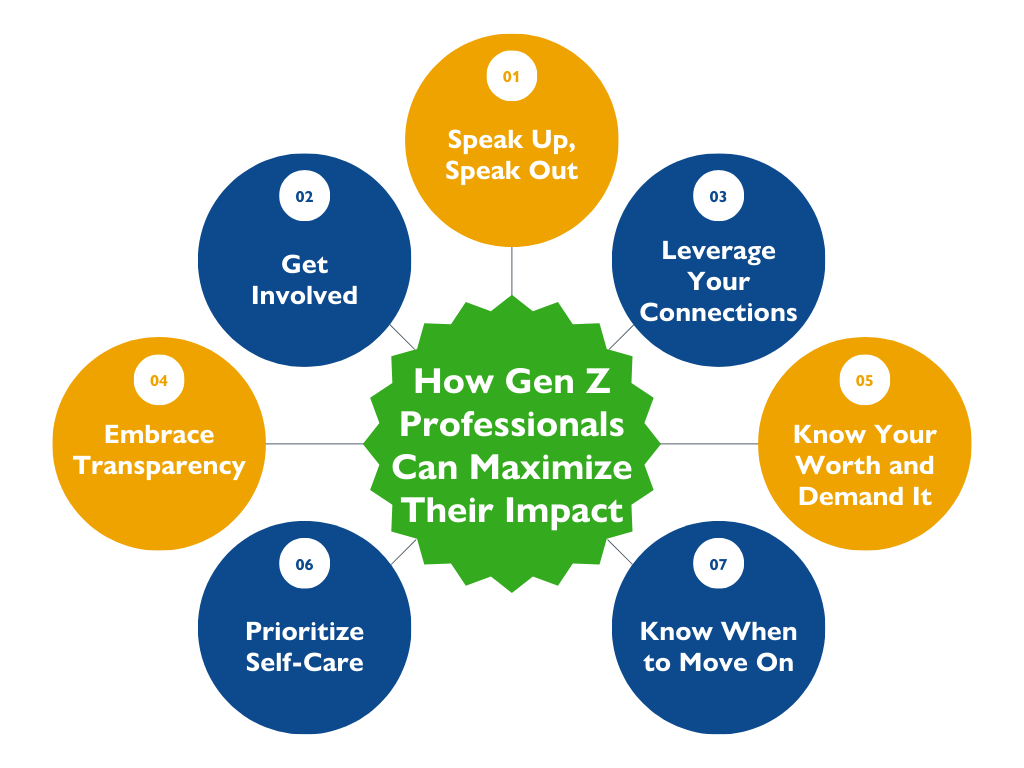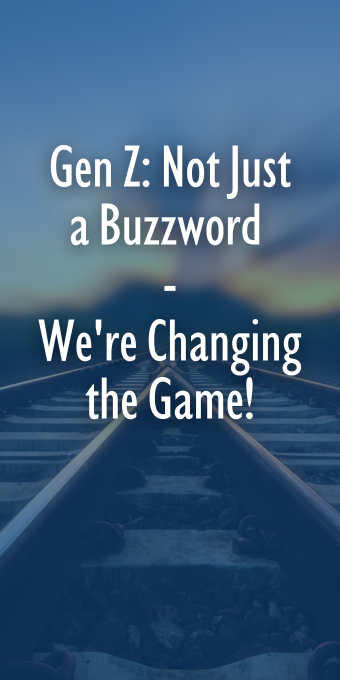Gen Z: Not Just a Buzzword – We’re Changing the Game!
By the end of 2024, Gen Z will make up a larger proportion of the workforce than baby boomers. Yet, despite our growing presence, there’s a striking disconnect between the conversations about Gen Z and the lived experiences of our generation. When researching for this article, we found numerous pieces analyzing Gen Z trends and offering advice to employers on how to “harness” our potential. However, as two Gen Z nonprofit professionals, we observed a glaring lack of focus on our perspectives. This oversight positions us as passive actors within traditional workplace structures. It’s time to shift the narrative; instead of focusing solely on how our generation can benefit employers, we must recognize our potential to be catalysts for change, particularly within the social impact sector.
Given our upbringing in a rapidly evolving political and technological landscape, we expect change and manage it well.[1] With constant digital access to the world around us, we have developed a deep connection to global issues like climate change and imperialism. These concerns drive our desire to work for employers who share our values of social justice.[2] For us, work is more than a paycheck; it’s a platform for creating positive impact. We value teamwork, transparent leadership, and a healthy work-life balance. As Roberta Katz, a Stanford University anthropologist, puts it “[Gen Z is] placing a value on the human experience and recognizing that life is more than work.”[3]
With these valuable perspectives in mind, we move to shift our attention to how Gen Z professionals can shape their own careers within the social sector, redefine narratives about their generation, and ultimately contribute to broader societal change. So, how can Gen Z professionals maximize their impact?

- Speak Up, Speak Out: Whether you are an experienced professional or new to the job, your voice matters. Use existing internal channels like newsletters, blogs, or feedback platforms to share your ideas. If these don’t exist in your workplace, advocate for them! Leverage your unique perspective, shaped by your education, lived experiences, and fresh outlook.
- Get Involved: Join committees or take on internal projects. These might not seem glamorous, but they’re an opportunity to build your skills, shape workplace culture, and create meaningful impact. Remember, radical change often starts from within. By fostering a more equitable and innovative work environment, we align ourselves more closely with mission-driven work. Focus on opportunities that complement your current workload and can be completed within regular work hours.
- Leverage Your Connections: For those just entering the workforce, it may seem like you don’t have a robust network. Your peers are valuable connections regardless of rank or experience. Even a small network can be a powerful resource for hiring, thought partnership, sharing resources and practices, and discussing working conditions.
- Embrace Transparency: Open conversations about your work life can help others learn, grow, and feel supported. Don’t be afraid to talk about your workplace culture. Is it inclusive? Supportive? Challenging? Sharing your perspective can spark important conversations and lead to positive change. And let’s talk about something that’s often taboo: salary. Talking openly about your compensation can help identify inequitable pay gaps, advocate for fair wages, and empower others to negotiate better salaries.
- Know Your Worth and Demand It: Your age doesn’t define your value. Gen Z faces unprecedented financial challenges, including soaring costs of living, inflation, and student debt – realities we cannot ignore.[7] Clearly understand your role and the value you bring to your employer to advocate confidently for opportunities, resources, and fair compensation.
- Prioritize Self-Care: A happy and healthy you is a more effective changemaker.
- Set Boundaries: It’s good to disconnect after work hours. Your free time is sacred; use it to recharge. Don’t fall into the trap of overworking.
- Say No: It’s okay to decline additional responsibilities when your plate is full. Setting limits demonstrates self-respect and ensures you deliver high-quality work.
- Know When to Move On: It’s essential to evaluate your professional journey regularly. Loyalty requires reciprocity; if your values don’t align with your company’s mission, growth opportunities are limited, or you’re not being compensated fairly, it may be time to explore new horizons. This doesn’t mean quitting impulsively. Carefully assess your situation, discuss options with your supervisor or colleagues, explore potential solutions, and make informed decisions.
The challenges facing our world demand bold solutions. Gen Z holds the power to shape what comes next in collaboration with preceding generations. By taking action and embracing our potential, this generation can rewrite the rules of the game and contribute to a brighter future for all.
Who We Are
Olivia Audsley (she/they) is a queer Puerto Rican Gen Z non-profit professional. She graduated Magna Cum Laude from Dartmouth College in 2021 with a degree in Latin American, Latine, and Caribbean Studies and Government, with a focus on global imperialism, economics, and movement-building. She is a community organizer and has worked in local and national non-profits as well as the federal government.
Estephany Gomez Bautista (she/her) is a first-generation Gen Z professional with a deep-rooted passion for social impact. She holds degrees in Political Science and Sociology from UCLA, with a minor in Labor and Workplace Studies. Her professional and volunteer experience spans both nonprofit and educational sectors, where she has gained valuable insights into the challenges and opportunities facing underserved communities.
[1] De Witte, M. (2024, February 14). 8 ways Gen Z will change the workforce. Stanford Report. Retrieved from https://news.stanford.edu/stories/2024/02/8-things-expect-gen-z-coworker
[2] Choughari, H. (2024, February 5). The Impact of Gen-Z in the Workplace. Forbes. Retrieved from https://www.forbes.com/sites/forbeshumanresourcescouncil/2024/02/05/the-impact-of-gen-z-in-the-workplace/
[3] (De Witte, 2024)
[4] Kepner, R. (2023, July 27). Thriving on Purpose: How Young Professionals Build Financial Stability in the Nonprofit World. Retrieved from La Piana Consulting: https://www.lapiana.org/thriving-on-purpose-how-young-professionals-build-financial-stability-in-the-nonprofit-world/
[5] Quillian, S. (2023, June 8). Now is the Time to Get Gen Z in the Nonprofit Sector: What We Can Gain from Private Sector Layoffs. Retrieved from La Piana Consulting: https://www.lapiana.org/now-is-time-to-get-gen-z-in-the-nonprofit-sector-what-we-can-gain-from-private-sector-layoffs/
[6] Cotenoff, S. (17, August 2023). Being an “Elder at work” – the other side of the Generational Divide. Retrieved from La Piana Consulting: https://www.lapiana.org/being-an-elder-at-work-the-other-side-of-the-generational-divide/
[7] Hur, K. (2024, May 12). Gen Z is getting hit hard by inflation. Retrieved from CNN: https://www.cnn.com/2024/05/12/investing/gen-z-inflation-debt/index.html


Comment section
1 thought on “Gen Z: Not Just a Buzzword – We’re Changing the Game!”